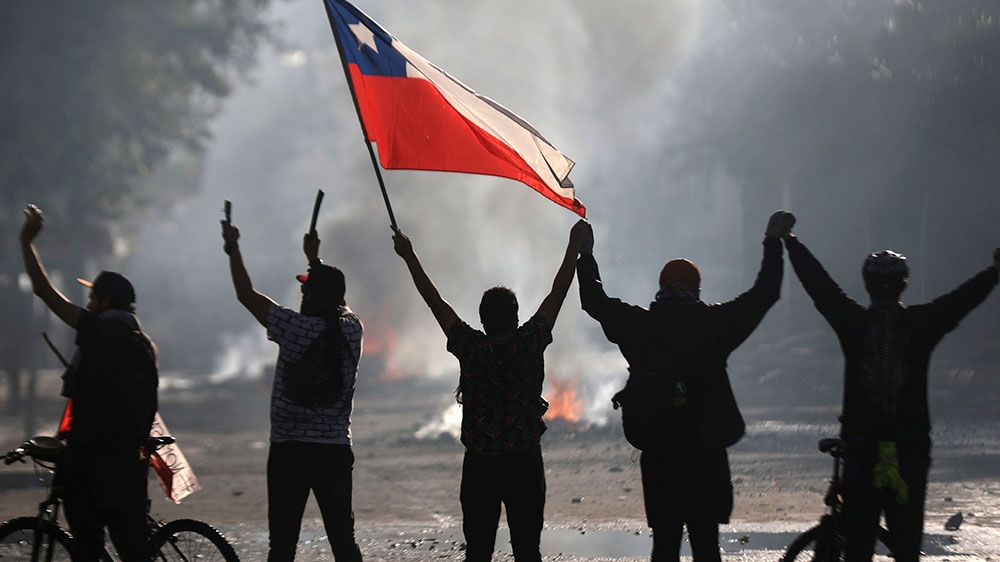Why world leaders need to listen to the powerless

In 2011, at the height of the so-called Arab Spring, Time magazine’s Person of the Year was “the protester.” Since then, the Arab Spring has abated, but demonstrations have shot up like green shoots across the globe. This year, in particular, seems to be the year of protest and civil disobedience. Wherever you look, the disenchanted flock to the streets to advocate for their cause, sometimes using violence and sometimes not.
There have been scenes of burning cars in Chile and Barcelona. France has the “gilets jaunes.” In Hong Kong, protesters advocate for democracy ever more violently. In Iraq, even the government had to admit that security forces used excessive force against those who took to the streets. A million people reportedly clogged up London’s Piccadilly and Whitehall on Saturday to peacefully advocate for a second Brexit referendum. There is also the schoolchildren who “go on strike” every Friday to raise awareness of climate change. Extinction Rebellion recently staged protests in major cities around the globe with the same aim, including in Central London two weeks ago, making it nearly impossible to get from A to B.
What is behind this phenomenon? There are essentially three categories. First is demonstrators who want to further a political goal, such as more democracy in Hong Kong, judicial leniency for independence advocates in Catalonia, the ability for all (even opposition politicians) to stand in local elections in Russia, or a second Brexit referendum in the UK. Another category is demonstrators targeting economic inequality, such as the gilets jaunes in France, who initially objected to a hike in fuel prices, or the recent demonstrations in Chile, which were caused by an increase in public transport fares. Iraq was a bit of both: Demonstrators objected to the lack of access to public services and corruption, which straddles both the economic and political realms. The last category covers overarching global goals, particularly climate change.
These demonstrations often start with one thing and morph into much more. Hong Kong is a good example. Five months ago, old and young, and even those in the business establishment, rose to articulate their objection to a controversial proposed law that would have allowed for criminal suspects to be extradited to mainland China. They feared what it would do to the relative independence of the territory from the People’s Republic, known as “one country, two systems.” Businesses in particular were concerned about what it would mean for their freedom to operate. The powers that be acted too late and the position of Chief Executive Carrie Lam has become all but untenable, even though the bill was formally scrapped on Wednesday.
Protesters feel that the disparity between rich and poor has become too great and that the affluent wield too much influence
Cornelia Meyer
The protesters are demanding that the entire legislature and the chief executive be elected by the people, rather than selected. Things have got out of hand and the territory is suffering, as is its business. Beijing is said to be looking at replacing Lam with an interim chief executive, which will probably not do the trick. This is just one example where a lack of empathy for the demonstrators’ plight has aggravated the situation.
Up until Donald Trump and Brexit, it was political parties that drove the agenda. Since then, it is increasingly movements that are more loosely organized and often have a single agenda. This is not dissimilar to how the demonstrators function. In other words, the movements correspond to the zeitgeist of the time.
This is enhanced by social media, which gives people the ability to organize horizontally — peer to peer — without the usual political organizations and party structures. Indeed, encrypted versions of messaging apps such as WhatsApp even allow them to avoid the long arm of the state, which is important in authoritarian or semi-authoritarian regimes. In other words, it has become possible to voice opinions outside the staid political process.
The root causes go beyond movements, though. Across the world, the voiceless want to stand up against what they feel are entitled elites. The gilets jaunes and demonstrators in Chile feel that the disparity between rich and poor has become too great and that the affluent wield too much influence, leaving their voices drowned out. So they take to the streets. Catalan separatists are frustrated that their attempt to split from Spain was thwarted. They are enraged by the unseemly, draconian punishment of their leaders, who had once been their elected representatives. The same can be said for the million people who took to the streets last Saturday asking for a second Brexit referendum. Climate change is the big concern for the young, and the political elites have probably been too slow to catch on. They are catching up fast though, as the recent election results in Switzerland and other countries prove.
We have to ask ourselves whether the political process is broken and the social contract is null and void. They are probably not but, in the aftermath of the global financial crisis, all eyes were on trying to save the financial system and with it the global economy. If the efforts of the G20 and central banks had not been successful, we would probably be in a much worse place. However, the leaders of this world need to pay attention to the plight of the less affluent and the powerless. We need to find ways to get their voices heard. If they feel continuously ignored, they will organize. Social media gives them the ability to do so, even if they lack organizational structures.
- Cornelia Meyer is a business consultant, macro-economist and energy expert. Twitter: @MeyerResources









































